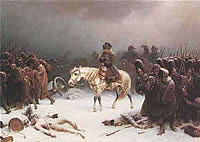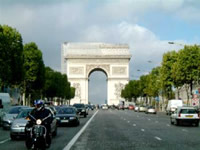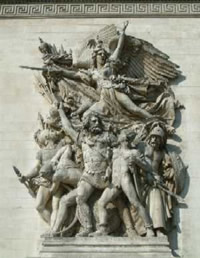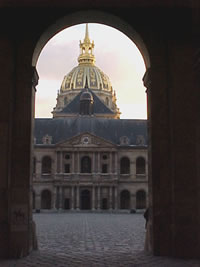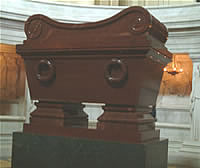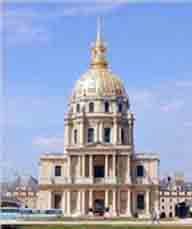
Napoleon Bonaparte
| French Home Page |
| Paris Home Page |
| Icons of France |
| Famous French People |
| 19th Century France Home Page |
| Christmas in France |
| Chateaux in France |
| Emperor of France | ||||||||
Napoleon believed that every person has the abilities to lead if they are given the chance. In those days, only people of noble birth were able to hold high rank in the army. Napoleon said that every ordinary soldier carried a Field Marshall's baton in his kit bag. By this he meant that any soldier could lead an army successfully if he had the qualities of a good leader. He set out to prove this. He attended military college in Paris. Although his peers made fun of him because of his small stature and funny accent, Napoleon proved he was a very clever student. Napoleon rose through the ranks to become a military officer and led his armies through many successful battles. He was soon made a general, and was highly respected by his troops for his leadership skills.
Napoleon was fascinated with the Pyramids and the history of Egypt. He insisted on taking with him, in the invasion force, a group of "savants". These were the most famous French scientists, historians and archaeologists of the era. Their task was to record and interpret everything that they saw. Their biggest problem, of course, was the fact that no-one could read hieroglyphics - the Egyptian picture writing. The find of the Rosetta Stone inspired French man Jean Paul Champollion who made cracking the code his life work. Napoleon returned to France in 1799. By now, he had become the most powerful man in France. He overthrew the government with little resistance and made himself Emperor for life.
At this time, France was at war with most countries in Europe. Napoleon led his armies into Italy, Spain, the German states, Belgium, Holland and many other countries to conquer them.
Napoleon soon realised that it was difficult to rule over so many different countries. They all had different laws, governments and ways of calculating weights and measures. For this reason, he introduced the Code Napoleon which was a system of laws which was applied all over Europe. Today, these laws form the legal system used by most European countries. He also encouraged and oversaw the introduction of the metric system to ensure a common system of weights and measures throughout his empire. Another important law that Napoleon made was that every child had to go to school between the ages of 5 and 11. This was because he thought education was necessary for everyone. Voting rights were extended, and divorce - which was not allowed by the Church - was recognised and legal. Napoleon ended his marriage to Josephine with divorce as they had had no children and he was desperate to have an heir who would succeed him. He married a young Austrian princess who bore him a son. In 1812, Napoleon invaded Russia. This was his big mistake as he went against the advice of his generals not to invade just before the start of winter. The Russian Tsar and his armies were cunning. Thy lured Napoleon deep into the country, to Moscow. As he advanced, the Tsar's armies enforced a "scorched earth" policy behind him - burning all the crops and killing the cattle. On Napoleon's arrival in Moscow, the Russians burned the city. Napoleon was forced to retreat, defeated. It was the depth of winter, with temperatures at minus 25C. Napoleon's armies starved as there was no food available on their return journey. Those who did not starve, froze to death. Hundreds of thousands of soldiers died. The campaign was a total disaster and marked the beginning of the end for Napoleon. The countries of Europe now realised that Napoleon could be beaten and so they combined to attack France. Over the next two years, Napoleon was beaten in battles and was banished to exile on the island of Elba in the Mediterranean Sea in 1814. However, the French remembered his courage and leadership skills and when he escaped from his island prison, they flocked to join him in tens of thousands.
Napoleon faced the British and their allies in his last battle, at Waterloo, in Belgium in 1815. It was a battle he nearly won. The German troops had waited on the side lines to see which way the battle was going before they joined in. When they saw the British were in trouble at the end of the day, they sent reinforcements to help. Napoleon was captured and sent into exile by the Allies to the island of Saint Helena in the South Atlantic, many thousands of kilometres away from his beloved France. He died a lonely death there in 1821. Napoleon's body was brought back to France many years later and today you can visit his tomb in the magnificent chapel of Les Invalides in Paris. It's a very grandiose tomb for a man who was : Le Petit Corporal. The Arc de Triomphe (envisaged by Napoleon) is a monument that commemorates his military skill and leadership. Opinion is divided about Napoleon today. Some people see him as a dictator who wanted to glorify himself at the expense of his nation. Other people remember him as a skilled leader who introduced many improvements to the way of life of the ordinary people. |
| A military genius | ||
|
Napoleon is regarded as a military genius. He was a great military leader and became the Emperor of France
Napoleon as a young man
The painting by artist David depicts a victorious Napoleon on his favourite horse.
Napoleon's retreat from Moscow - a military disaster which marked the beginning of the end of his dreams of a European empire. It is estimated that some five hundred thousand French troops perished during this campaign.
Napoleon envisaged a triumphal arch which his victorious troops could march through, rather like those which existed in Roman times. His dream did not become reality until a long time after his death. Click here to find out more.
The plaques on the side of the Arc de Triomphe respresent Napoleon and his armies going to war, led by a victorious Marianne, who embodies the spirit of France.
Napoleon as an older man. He spent his last years in lonely exile on an island in the South Atlantic.
Les Invalides, Paris, where Napoleon's tomb is located.
Napoleon's tomb
The Chapel housing Napoleon's Tomb
|
||
On other pages
Did you know?

This is the flag of Paris.
Notre Dame was nearly demolished. It was only saved by Victor Hugo's campaign to save it. Click here to find out more.







